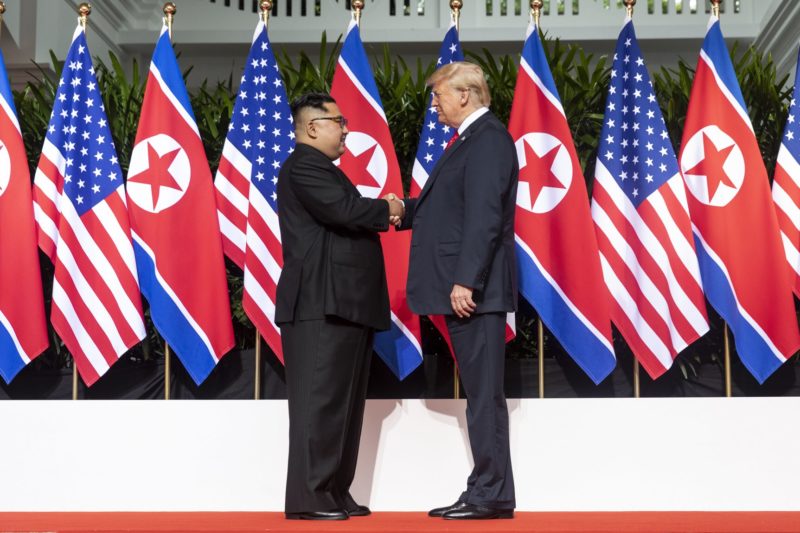Understanding the Conundrum of North Korea
By Sunny Kim
Reporting Texas

Kim Jong-un and Donald Trump at the start of summit talks in Hanoi on Feb. 27. Courtesy of Dan Scavino via Twitter.

Robert Oppenheim
President Trump’s bid to persuade North Korea to give up its nuclear weapons in return for lifting U.S. economic sanctions has hit a snag. Last week, summit talks in Hanoi collapsed. This week, news reports citing intelligence sources say Pyongyang is rebuilding facilities for its intercontinental ballistic missile program. With America’s thorniest bilateral relationship in limbo, Reporting Texas asked professor Robert Oppenheim, professor and Posco Chair in Korean Studies at the University of Texas, to shed light on the issues. Herewith excerpts:
On the summit talks in Hanoi:
Trump wanted to swing for the fences and get the big political wins all at once. Kim Jong-un’s preference seems to be a more gradual approach. Whether or not they disagreed about the actual endpoint, they disagreed about the pathway to the endpoint. But this may not be a permanent breakup. It’s likely there’s going to be another round after a decent interval.
On what Americans don’t understand about North Korea:
North Korea hasn’t always been (a) broken (state). Until the ‘70s, it had a greater degree of industrial development than South Korea. Through the 1990s, it was doing relatively OK in part because it (was) able to import energy from the Soviet Union at what were called “friendship prices.” When the Soviet Union collapsed, North Korea had to pay the full cost for energy and other imports, and the rest of the socialist world collapsed. That’s one of the factors that put the economy into a tailspin. The immediate results were the famines in the 1990s.
The desire on the part of the government to pursue nuclear, rocketry, a space program – those get a laugh out of the rest of the world, but they fall into a pattern of North Korea’s state commitment to certain kinds of industrial science and technology.
On North Korean society:
It’s important to realize there are relative winners in North Korean society. There are people who live in Pyongyang who might not be well-off by global standards, but they are rewarded by the system and chances are their lives are not going to improve if the system falls. If we assume that if only Kim Jong-un were to go away, everybody would be happy, I think that’s a faulty assumption. I don’t think we should entirely discount the idea that Kim Jong-un has a certain amount of domestic support. It’s not just him against his own people.
On Kim Jong-un’s reluctance to give up nuclear weapons:
Nuclear weapons are kind of a trump card, no pun intended. It is the one thing that probably would prevent (a) U.S. invasion. The lesson North Korea takes from the early 2000s is that Iraq got invaded because they didn’t have nuclear weapons. There’s an argument out there that North Korea’s never going to be willing to give (theirs) up or at least give them all up. It is their deterrent, in the same way that nuclear weapons are a deterrent for the U.S.
On the benefits of a possible U.S. invasion:
None. Very few. It would be a tremendously costly war.
On why U.S. troops are stationed in South Korea:
U.S. troops have been there since before the Korean War, but certainly remained after the (war) to do two things: to prevent the North from attacking (the South) and to prevent either side from attacking the other side again. U.S. troops are there to project power in the region.
On how North Korea is portrayed in U.S. media:
There is a famous article by an author named Hazel Smith. Her point is that the emphasis on the crazy stories about Kim Jong-il’s birth, prison camps, famine or about nukes, dominate a lot of the conversation about North Korea (so) you could be forgiven for forgetting there’s an actual society there. I don’t think she is denying that any of these other things exist, but even in societies like that there are people who go about their everyday lives, and some are in decent circumstances; others are not.
On the likelihood of the two Koreas unifying:
I don’t think it’s going to happen soon. The most optimistic but possible scenario for me would be gradual lessening of tensions in the North, a gradual kind of economic normalization between the two sides, but even that would be ridiculously expensive. I don’t foresee unification happening in a thunderclap moment.